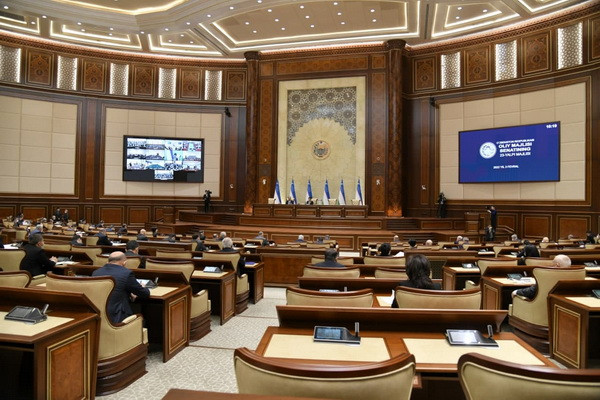
Priority tasks identified in the State Program for 2022 discussed
Tashkent, Uzbekistan (UzDaily.com) -- At the next plenary session of the Senate, issues of ensuring the implementation of the State Program for the implementation of the Development Strategy of New Uzbekistan for 2022-2026 in the "Year of Ensuring Human Interests and Development of the Mahalla" were discussed.
It was noted that within the framework of the Action Strategy in five priority areas of development of our country in 2017-2021, about 300 laws were adopted, more than 4 thousand documents of the President of the Republic of Uzbekistan aimed at fundamental reforming of all spheres of state and public life.
The Development Strategy, which is a logical continuation of the Action Strategy, clearly defines the development trends of Uzbekistan in the near and medium term, the directions for the integrated development of all spheres of state and public life.
The significance of this historical document lies in the fact that during its development the existing problems were taken into account, the actual tasks that are waiting for their solution are reflected. Most importantly, our people took an active part in the development of the document.
The Development Strategy defines "100 goals in the name of human honor and dignity" in 7 priority areas.
As part of the implementation of the State Program, it is planned to allocate funds in the amount of 55 trillion soums and US$11.7 billion.
The chambers of the Oliy Majlis were determined to be responsible for ensuring the implementation of the directions of the State Program for building a people’s state by improving human dignity and further developing a free civil society.
Parliamentary control will be established over the implementation of priority tasks aimed at the integrated socio-economic development of the regions, ensuring employment and increasing the incomes of the population.
It was also noted at the meeting that special attention was paid to strengthening the role of the chambers of the Oliy Majlis and political parties in the consistent continuation of reforms in our country.
In particular, the need was noted for strengthening control over the activities of territorial executive bodies by forming a deputy corps in the Kengash of people’s deputies acting on a permanent basis, and expanding their powers.
The state program also stipulates measures to improve the efficiency of the mahalla institution, turning it into the main link in public administration and control. At the same time, such tasks as expanding the powers of mahallas, their relations with the public, and assisting in the effective establishment of the activities of assistant khokims in solving socio-economic problems in the regions will be fulfilled.
In addition, such priority areas have been identified as bringing the institutional framework for the activities of local government bodies in line with modern requirements, transforming the activities of public administration bodies based on the principle of "Provision of services to citizens", the introduction of a compact, professional, fair, highly efficient public administration system.
The practice of defining specific strategic tasks for budgetary organizations and sending requests to them will also be introduced. It is envisaged to establish direct, remote work with the regions, to strengthen the participation of representative bodies in matters of regional development.
During the discussion, it was noted that the implementation of these tasks on the ground should be in the focus of attention of the relevant committees of the Senate, local senators and local Kengashes.
At the meeting, the Senate’s action plan for the implementation of the priority tasks identified by the State Program was approved, and a corresponding resolution was adopted.